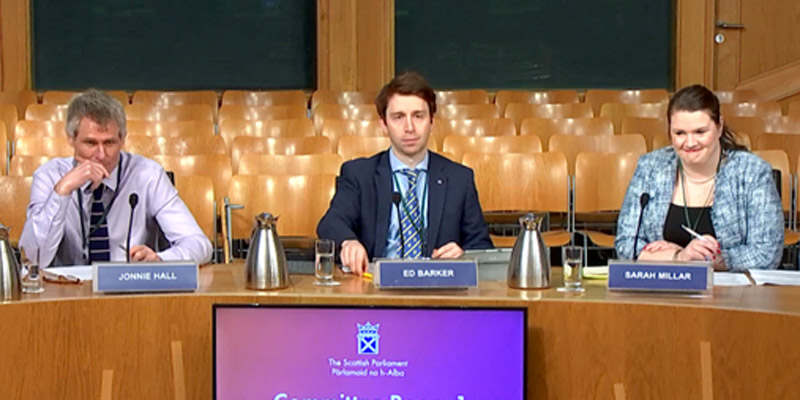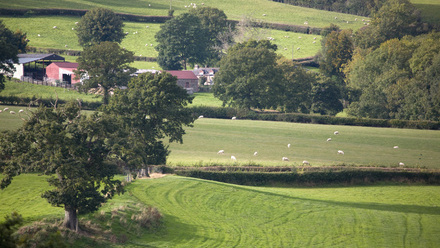Video: Support agri-trade by tracking UK-EU and internal market divergence, AIC tells MSPs

Businesses are concerned about the divergence in food and farming policies between the UK and EU, as well as within the home nations, the Agricultural Industries Confederation (AIC) has told a trade inquiry.
The agri-supply trade association's Head of Policy and External Affairs gave evidence before the Scottish Parliament's Constitution, Europe, External Affairs and Culture Committee yesterday (7 March), where MSPs are holding an inquiry on the EU-UK Trade and Cooperation Agreement.
The Committee is examining how trade in goods and services between the EU and the UK is working, if there are areas for improvement, and whether there is an interest in developing the trading relationship further.
Mr Barker was giving evidence alongside representatives from the National Farmers' Union Scotland and Quality Meat Scotland.
Watch some highlights from the committee hearing below, or visit the Scottish Parliament website to rewatch the session in full.
Divergence concerns
Answering questions from MSPs on how the post-EU Exit trading arrangements with the EU were affecting Scottish agriculture - including crop traders and manufacturers and suppliers of animal feed, crop protection products, fertiliser and seed - Mr Barker explained that divergence was now a major challenge.
Currently, there is no formal policy or mechanism established by the Government to monitor or track the growing policy divergences between the UK and EU, with trade bodies and businesses left to undertake this crucial work themselves.
"Now that we're four or five years on from that [EU Exit] process, we’re really experiencing the divergence.
"AIC and its Member businesses are having to work out themselves as to what this divergence means, whether that's divergence in policy - such as precision breeding in England which creates internal market challenges - but also Carbon Border Adjust Mechanism (CBAM), deforestation, due diligence legislation, and farm support policies.
"The other side is the technical standards of divergence. All the time there are individual products like herbicides or animal feeds that are either facing a withdrawal or end of their licence. There are small misalignments that we have to keep up with all the time across all sectors."
Divergence occurs when laws and regulations in the UK and EU differ or do not align, potentially causing trade friction between the two.
UK internal market
Mr Barker added that agri-supply businesses also have significant concerns around the divergence occurring between the four nations of the UK.
This is why the industry needs the Government to track and address these divergence issues - a core ask of the next UK Government in AIC's 2024 General Election manifesto.
He said: "The internal market of the UK is a huge part of AIC Scotland Member's export business, certainly for animal feed and seed.
"The vast majority of AIC Scotland Member businesses are trading in other parts of the UK too, and so monitoring work is the starting point.
"We haven’t measured anything, we have no idea as to the total divergence that is taking place and so it does need to be co-ordinated."
Costs and complications
Kate Forbes MSP asked Mr Barker about the extent to which EU Exit impacts have changed what Scottish agriculture produces and whether there was now a focus on the domestic market because exporting goods to the EU had become more challenging.
Mr Barker replied that one challenge was Scottish farmers growing crops other than wheat and barley, known as break crops, because of the associated supply chain costs and red tape, as well as more limited markets.
"The supply chain would like to see a more diverse cropping rotation. EU Exit has definitely made growing break crops, such as oilseeds and pulses, a lot more difficult.
"We have to register our chemicals separately [to the EU] under the UK REACH regime, the costs of importing high-quality seed have gone up and we need to export that seed too because there’s a two-way flow of trade.
"So despite the benefits, trying to move into other crops is disproportionately expensive."

He added that one of the key reasons why certain situations had improved was due to the attitude of businesses to try and resolve the problems they are faced with.
MSPs heard that fundamental challenges remain, as Mr Barker reminded the inquiry that many agri-supply businesses in Scotland are export-orientated, including for animal feed products.
"This is why we would really support a veterinary agreement with the EU to be prioritised," said Mr Barker - a key ask in AIC's 2024 General Election manifesto.
Having a veterinary or “Sanitary/Phytosanitary (SPS)” agreement would allow goods to be traded more easily with the EU and with Northern Ireland, while respecting the UK’s independence in trade and legislation.
Visit AIC's General Election 2024 webpage to find out more about its asks of the next UK Government and download its manifesto.
'Quick fixes and patch-ups'
A lack of certainty was raised as a broader problem for agri-supply businesses.
"In the past few years, we’ve been very reliant on quick fixes and patch-ups for things that have just been sprung on us at short notice," explained Mr Barker.
He said examples of this were the work of AIC and others to maintain access to treaded maize seed beyond the end of 2023 and efforts to engage with the European Commission over the potential loss of recognition of the UK's Renewable Energy Directive (RED) assurance status for biofuels crops.
Both issues posed major risks for UK agriculture and required many months of intense industry collaboration, lobbying and negotiation to resolve.
"These small patch-ups really don’t help with providing long-term security or predictability that the supply chain needs."





